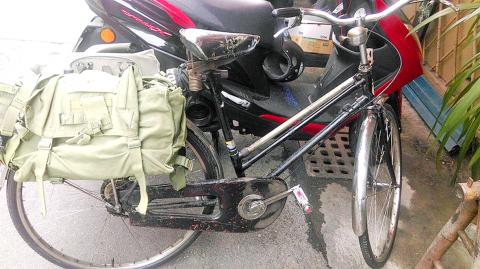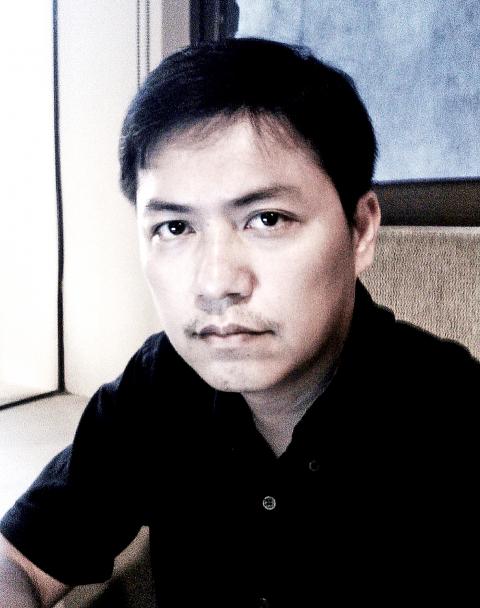Novelists usually pursue fame and book sales through publicists, book fairs and social media, but Wu Ming-yi’s (吳明益) approach has been far from typical. The novelist and academic spent the summer holiday riding an antique bicycle around Taiwan, meeting fans and giving lectures at small, independent bookstores to promote his book, The Stolen Bicycle (單車失竊記).
“People appreciate the opportunity to connect with me more intimately in these small spaces,” Wu told a standing-room-only audience at Tainan’s Lingo Bookstore (林檎二手書室). He added that he was a marketing major in college, and it was ironic that he chose to go against everything he learned about marketing and promotion.
Wu says he enjoys sharing the knowledge that he learned about Taiwan’s flora and fauna in his research papers, and started building a following that appreciated his message of ecological conservation. Eventually, he began toying with the introduction of creative fiction to enhance his message, and his career as a novelist developed.

Photo: Tony Coolidge
The novel, inspired by his love for bicycles and Taiwanese history, brings readers back to a simpler time when life moved more slowly and people spent more time face-to-face with friends and neighbors. Riding a bike allowed people to appreciate and digest the details of the world around them.
Wu said that success growing a fan base in Taiwan was not easy until he partnered with a talented literary agent and translator who helped him generate success overseas.
Although Wu shunned modern marketing and choose a grueling, sweaty book promotion schedule at small venues around the nation, the whole experience furthered his reputation as an approachable man who preferred to have a meaningful discussion over coffee rather than take a selfie with a fan. And Wu seems committed to enduring more heat and sweat to make sure more people get it.

Photo courtesy of Wu Ming-yi

Towering high above Taiwan’s capital city at 508 meters, Taipei 101 dominates the skyline. The earthquake-proof skyscraper of steel and glass has captured the imagination of professional rock climber Alex Honnold for more than a decade. Tomorrow morning, he will climb it in his signature free solo style — without ropes or protective equipment. And Netflix will broadcast it — live. The event’s announcement has drawn both excitement and trepidation, as well as some concerns over the ethical implications of attempting such a high-risk endeavor on live broadcast. Many have questioned Honnold’s desire to continues his free-solo climbs now that he’s a

As Taiwan’s second most populous city, Taichung looms large in the electoral map. Taiwanese political commentators describe it — along with neighboring Changhua County — as Taiwan’s “swing states” (搖擺州), which is a curious direct borrowing from American election terminology. In the early post-Martial Law era, Taichung was referred to as a “desert of democracy” because while the Democratic Progressive Party (DPP) was winning elections in the north and south, Taichung remained staunchly loyal to the Chinese Nationalist Party (KMT). That changed over time, but in both Changhua and Taichung, the DPP still suffers from a “one-term curse,” with the

Lines between cop and criminal get murky in Joe Carnahan’s The Rip, a crime thriller set across one foggy Miami night, starring Matt Damon and Ben Affleck. Damon and Affleck, of course, are so closely associated with Boston — most recently they produced the 2024 heist movie The Instigators there — that a detour to South Florida puts them, a little awkwardly, in an entirely different movie landscape. This is Miami Vice territory or Elmore Leonard Land, not Southie or The Town. In The Rip, they play Miami narcotics officers who come upon a cartel stash house that Lt. Dane Dumars (Damon)

Today Taiwanese accept as legitimate government control of many aspects of land use. That legitimacy hides in plain sight the way the system of authoritarian land grabs that favored big firms in the developmentalist era has given way to a government land grab system that favors big developers in the modern democratic era. Articles 142 and 143 of the Republic of China (ROC) Constitution form the basis of that control. They incorporate the thinking of Sun Yat-sen (孫逸仙) in considering the problems of land in China. Article 143 states: “All land within the territory of the Republic of China shall